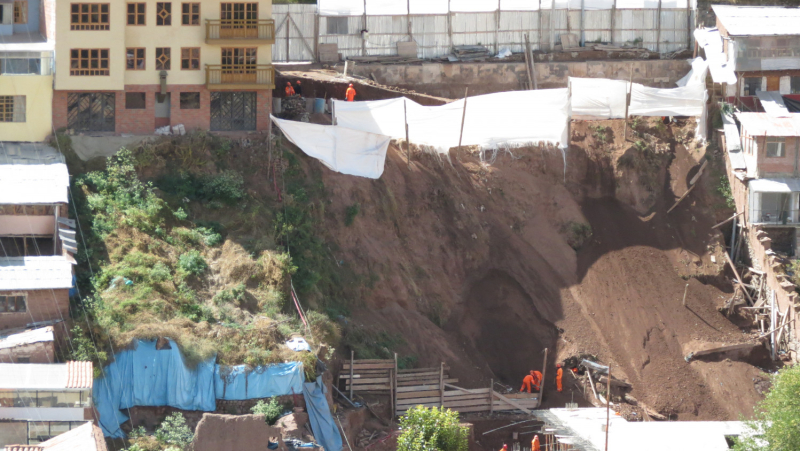Project – On record
This profile is no longer actively maintained, with the information now possibly out of dateBankTrack, in collaboration with community activists

Project – On record
This profile is no longer actively maintained, with the information now possibly out of dateBankTrack, in collaboration with community activists
Why this profile?
An Inka religious and historic site (including a temple and a cemetery) has been destroyed by Marriott International, with the financing of Banco de Credito del Peru and the complicity of the Peruvian government.
What must happen
Banco de Crédito del Perú should not provide any further financial support for this project, and should fund the restoration of the site that was destroyed with its financing. Marriott International Inc. should abandon the project and return the Inka artifacts that were removed from the site. The government of Peru should demolish the buildings built on the site and return the site as close as possible to its original condition.
| Sectors | Hotels and Motels |
| Location |
|
| Status |
Planning
Design
Agreement
Construction
Operation
Closure
Decommission
|
Marriott International and its local partners Inmobiliaria R&G and Corrales Ingenieros, with financing from Banco de Crédito del Perú, have destroyed a registered UNESCO World Heritage site in the historic Inka city of Cusco, Peru. The site consisted of the Inka Huacapunku temple and an Inka cemetery. Five ceremonial burial sites were removed from the cemetery, together with more than 500 Inka artifacts. The demolition of the temple and the illegal removal of corpses and ceremonial artifacts from the cemetery took place to clear the land to build a Marriott "Four Points by Sheraton" hotel on the site. UNESCO has decried this attack against cultural property. The site was a place of religious worship for the Quechua people.
Social and human rights impacts
Impact on protected heritage The city of Cusco, the former capital of the Inka empire, is listed as a UNESCO World Heritage Site. To build the hotel, Corrales Ingenieros, Inmobiliaria R&G and Marriott demolished the existing Huacapunku Temple and conducted excavations to build the foundations. In this process, an Inka cemetery was desecrated, five ceremonial burial sites removed and valuable Inka artifacts removed from the site. This activity has been a direct attack on Peruvian cultural heritage. In addition, it has directly affected the Quechua people who used the site as a place of worship.
UNESCO and ICOMOS (the International Council on Monuments and Sites, which advises UNESCO) have sent letters to the Peruvian State requesting the demolition of the hotel. In September 2019 the Cusco Court of Appeals ordered the demolition of the hotel; an order which was welcomed by ICOMOS. However in November 2020 the district court in charge of executing that decision decided that only 10% of the hotel would be demolished. The decision of the district court will be re-examined by the Court of Appeals.
Impact on livelihoods The project has affected the livelihoods of the people living in the surrounding area. When the cultural site was intact there was a harmonious relationship between the normal activities in the neighbourhood and the landscape. The destruction of the site has altered the configuration of the city. The removal of the cemetery is a desecrating activity that has inflicted psychological suffering to the Cusco population.
Impacts on Indigenous peoples' rights The project has impacted human rights of the entire Peruvian population, but particularly the human rights of the Quechua people, one of the world’s largest indigenous populations. This is a limited list of impacts on human rights:
- The right of the conservation of their culture, recognised in article 15(2) of the International Covenant on Economic, Social and Cultural Rights and the UNESCO Declaration concerning the Intentional Destruction of Cultural Heritage.
- The right to religious freedom, freedom of worship and the right to manifest its religion, recognised in article 18 of the Universal Declaration of Human Rights.
- The right to ethnic and cultural identity, recognised in article 2(19) of the Peruvian Constitution.
- The right to Free, Prior and Informed Consent (FPIC), as recognised in the United Nations Declaration on the Rights of Indigenous Peoples (UNDRIP), which allows Indigenous peoples to give or withhold consent to a project that may affect them or their territories.
Environmental and climate impacts
The construction of such a large-scale project in this area has caused unusual pollution to nearly 3,000 people living in the surroundings. The use of heavy machinery to extract and transport construction material and the debris generated has seriously impacted the community.
Loan agreements and mortgage deed records seen by BankTrack show Banco de Crédito del Perú financed the project through a series of loans between 19th June 2014 and 10th August 2017.
Peru's Resolución SBS N° 1928-2015 – Regulation for the Management of Social and Environmental Risk
